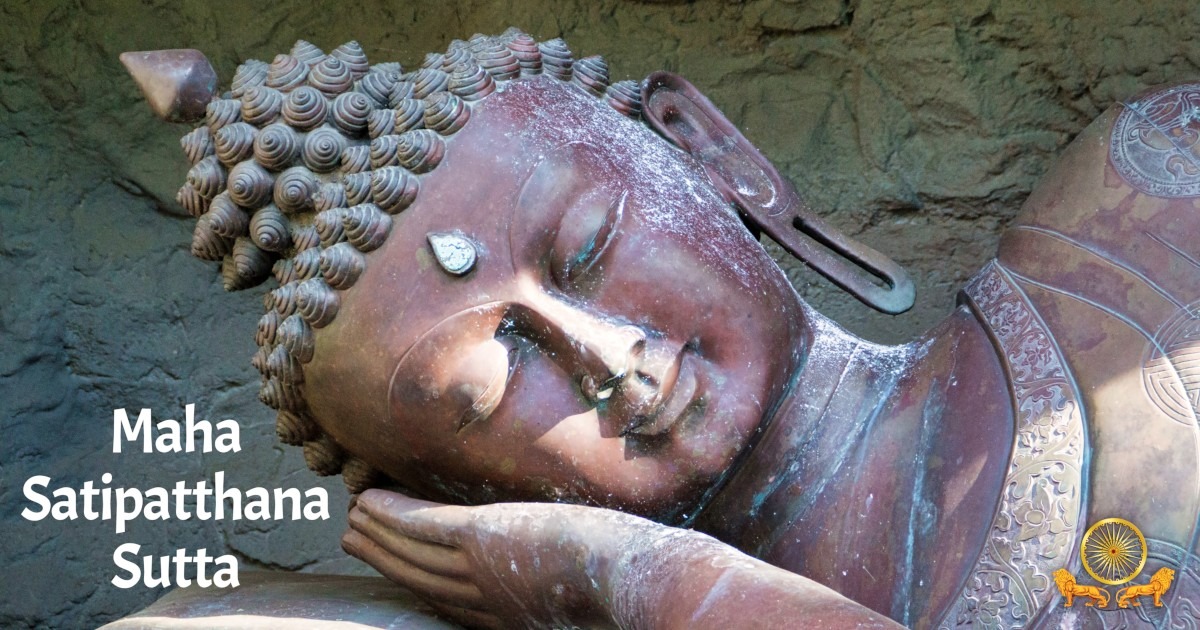4. Dhammānupassanā:
Contemplation of Phenomena
4.4 Bojjhanga Pabbaṁ: Section on the Factors of Enlightenment
Puna ca paraṁ bhikkhave bhikkhu / dhammesu dhammānupassī viharati,/ sattasu bojjhaṅgesu./ Kathañca bhikkhave bhikkhu / dhammesu dhammānupassī viharati,/ sattasu bojjhaṅgesu?/
“Again monks, a monk dwells contemplating phenomena in phenomena • in terms of the seven enlightenment factors. And how monks, does a monk dwell contemplating phenomena in phenomena • in terms of the seven enlightenment factors?
Idha bhikkhave bhikkhu / santaṁ vā ajjhattaṁ sati sambojjhaṅgaṁ,/ ‘atthi me ajjhattaṁ sati sambojjhaṅgo’ti pajānāti./ Asantaṁ vā ajjhattaṁ sati sambojjhaṅgaṁ,/ “natthi me ajjhattaṁ sati sambojjhaṅgo’ti pajānāti./ Yathā ca anuppannassa sati sambojjhaṅgassa uppādo hoti / tañca pajānāti,/ yathā ca uppannassa sati sambojjhaṅgassa bhāvanāya pāripūri hoti, tañca pajānāti./
“Here monks, there being the mindfulness enlightenment factor in him, • a monk understands: • ‘There is the mindfulness enlightenment factor in me.’ There being no mindfulness enlightenment factor in him, • he understands: • ‘There is no mindfulness enlightenment factor in me.’ He also understands how there comes to be • the arising of the unarisen mindfulness enlightenment factor, • and how the arisen mindfulness enlightenment factor • comes to fulfillment by development.
Santaṁ vā ajjhattaṁ dhammavicaya sambojjhaṅgaṁ,/ ‘atthi me ajjhattaṁ dhammavicaya sambojjhaṅgo’ti pajānāti./ Asantaṁ vā ajjhattaṁ dhammavicaya sambojjhaṅgaṁ,/ natthi me ajjhattaṁ dhammavicaya sambojjhaṅgo’ti pajānāti./ Yathā ca anuppannassa dhammavicaya sambojjhaṅgassa uppādo hoti,/ tañca pajānāti./ Yathā ca uppannassa dhammavicaya sambojjhaṅgassa bhāvanāya pāripūrī hoti,/ tañca pajānāti./
“There being the investigation of phenomena enlightenment factor in him, • a monk understands: • ‘There is the investigation of phenomena enlightenment factor in me.’ There being no investigation of phenomena enlightenment factor in him, • he understands: • ‘There is no investigation of phenomena enlightenment factor in me.’ He also understands how there comes to be • the arising of the unarisen investigation of phenomena enlightenment factor, • and how the arisen investigation of phenomena enlightenment factor • comes to fulfillment by development.
Santaṁ vā ajjhattaṁ viriya sambojjhaṅgaṁ,/ ‘atthi me ajjhattaṁ viriya sambojjhaṅgo’eti pajānāti./ Asantaṁ vā ajjhattaṁ viriya sambojjhaṅgaṁ,/ natthi me ajjhattaṁ viriya sambojjhaṅgo’ti pajānāti./ Yathā ca anuppannassa viriya sambojjhaṅgassa uppādo hoti,/ tañca pajānāti./ Yathā ca uppannassa viriya sambojjhaṅgassa bhāvanāya pāripūrī hoti,/ tañca pajānāti./
“There being the energy enlightenment factor in him, • a monk understands: • ‘There is the energy enlightenment factor in me.’ There being no energy enlightenment factor in him, • he understands: • ‘There is no energy enlightenment factor in me.’ He also understands how there comes to be • the arising of the unarisen energy enlightenment factor, • and how the arisen energy enlightenment factor • comes to fulfillment by development.
Santaṁ vā ajjhattā pīti sambojjhaṅgaṁ,/ ‘atthi me ajjhattaṁ pīti sambojjhaṅgo’ti pajānāti./ Asantaṁ vā ajjhattaṁ pīti sambojjhaṅgaṁ,/ ‘natthi me ajjhattaṁ pīti sambojjhaṅgo’ti pajānāti./ Yathā ca anuppannassa pīti sambojjhaṅgassa uppādo hoti,/ tañca pajānāti./ Yathā ca uppannassa pīti sambojjhaṅgassa bhāvanāya pāripūrī hoti,/ tañca pajānāti./
“There being the rapture enlightenment factor in him, • a monk understands: • ‘There is the rapture enlightenment factor in me.’ There being no rapture enlightenment factor in him, • he understands: • ‘There is no rapture enlightenment factor in me.’ He also understands how there comes to be • the arising of the unarisen rapture enlightenment factor, • and how the arisen rapture enlightenment factor • comes to fulfillment by development.
Santaṁ vā ajjhattaṁ passaddhi sambojjhaṅgaṁ,/ ‘atthi me ajjhattaṁ passaddhi sambojjhaṅgo’ti pajānāti./ Asantaṁ vā ajjhattaṁ passaddhi sambojjhaṅgaṁ,/ ‘natthi me ajjhattaṁ passaddhi sambojjhaṅgo’ti pajānāti./ Yathā ca anuppannassa passaddhi sambojjhaṅgassa uppādo hoti,/ tañca pajānāti./ Yathā ca uppannassa passaddhi sambojjhaṅgassa bhāvanāya pāripūrī hoti,/ tañca pajānāti./
“There being the tranquility enlightenment factor in him, • a monk understands: • ‘There is the tranquility enlightenment factor in me.’ There being no tranquility enlightenment factor in him, • he understands: • ‘There is no tranquility enlightenment factor in me.’ He also understands how there comes to be • the arising of the unarisen tranquility enlightenment factor, • and how the arisen tranquility enlightenment factor • comes to fulfillment by development.
Santaṁ vā ajjhattaṁ samādhi sambojjhaṅgaṁ,/ ‘atthi me ajjhattaṁ samādhi sambojjhaṅgo’ti pajānāti./ Asantaṁ vā ajjhattaṁ samādhi sambojjhaṅgaṁ,/ ‘natthi me ajjhattaṁ samādhi sambojjhaṅgo’ti pajānāti./ Yathā ca anuppannassa samādhi sambojjhagassa uppādo hoti,/ tañca pajānāti./ Yathā ca uppannassa samādhi sambojjhaṅgassa bhāvanāya pāripūrī hoti,/ tañca pajānāti./
“There being the concentration enlightenment factor in him, • a monk understands: • ‘There is the concentration enlightenment factor in me.’ There being no concentration enlightenment factor in him, • he understands: • ‘There is no concentration enlightenment factor in me.’ He also understands how there comes to be • the arising of the unarisen concentration enlightenment factor, • and how the arisen concentration enlightenment factor • comes to fulfillment by development.
Santaṁ vā ajjhattaṁ upekkhā sambojjhaṅgaṁ,/ ‘atthi me ajjhattaṁ upekkhā sambojjhaṅgo’ti pajānāti./ Asantaṁ vā ajjhattaṁ upekkhā sambojjhaṅgaṁ,/ ‘natthi me ajjhattaṁ upekkhā sambojjhaṅgo’ti pajānāti./ Yathā ca anuppannassa upekkhā sambojjhaṅgassa uppādo hoti,/ tañca pajānāti./ Yathā ca uppannassa upekkhā sambojjhaṅgassa bhāvanāya pāripūrī hoti,/ tañca pajānāti./
“There being the equanimity enlightenment factor in him, • a monk understands: • ‘There is the equanimity enlightenment factor in me.’ There being no equanimity enlightenment factor in him, • he understands: • ‘There is no equanimity enlightenment factor in me.’ He also understands how there comes to be • the arising of the unarisen equanimity enlightenment factor, • and how the arisen equanimity enlightenment factor • comes to fulfillment by development.
Iti ajjhattaṁ vā dhammesu dhammānupassī viharati,/ bahiddhā vā dhammesu dhammānupassī viharati./ Ajjhatta bahiddhā vā dhammesu dhammānupassī viharati./
“In this way he dwells contemplating phenomena in phenomena within himself, • he dwells contemplating phenomena in phenomena within another, • and he dwells contemplating phenomena in phenomena • both within himself and within another.
Samudaya dhammānupassī vā dhammesu viharati,/ vaya dhammānupassī vā dhammesu viharati,/ samudaya vaya dhammānupassī vā dhammesu viharati./
“He dwells contemplating the arising of the phenomena, • he dwells contemplating the passing away of the phenomena, • and he dwells contemplating the arising and passing away of the phenomena.
Atthi dhammāti vā panassa sati paccupaṭṭhitā hoti,/ yāvadeva ñāṇa mattāya patissati mattāya./ Anissito ca viharati./ Na ca kiñci loke upādiyati./
“Mindfulness, that there are phenomena is simply established in him • to the extent necessary for higher knowledge and mindfulness. He dwells independent, and not clinging to anything in the world.
Evampi kho bhikkhave bhikkhu / dhammesu dhammānupassi viharati,/ sattasu bojjhaṅgesu./
That is how monks, a monk dwells contemplating the phenomena in phenomena • in terms of the seven factors of enlightenment.
- Uddeso: Introduction
- 1. Kāyānupassanā: The Observation of Body
- 1.1 Ānāpāna Pabbaṁ: Section on Breathing
- 1.2. Iriyāpatha Pabbaṁ: Section on Postures
- 1.3 Sampajañña Pabbaṁ: Section on Clear Comprehension
- 1.4 Paṭikūlamanasikāra Pabbaṁ: Section on Repulsiveness
- 1.5 Dhātumanasikāra Pabbaṁ: Reflections on the Elements
- 1.6 Navasīvathika Pabbaṁ: Nine Charnel-Ground Contemplations
- 2. Vedanānupassanā: Contemplation of Feeling
- 3. Cittānupassanā: Contemplation of Mind
- 4. Dhammānupassanā: Contemplation of Phenomena
- 4.1 Nīvaraṇa Pabbaṁ: Section on the Hindrances
- 4.2 Khandha Pabbaṁ: Section on the Aggregates
- 4.3 Āyatana Pabbaṁ: Section on the Sense Bases
- 4.4 Bojjhanga Pabbaṁ: Section on the Factors of Enlightenment
- 4.5 Sacca Pabbaṁ: Section on the Four Noble Truths
- Satipaṭṭhāna Bhāvanānisaṁso: The Results of the Establishing of Mindfulness

Learn how to purchase on the main book page.




















Leave A Comment